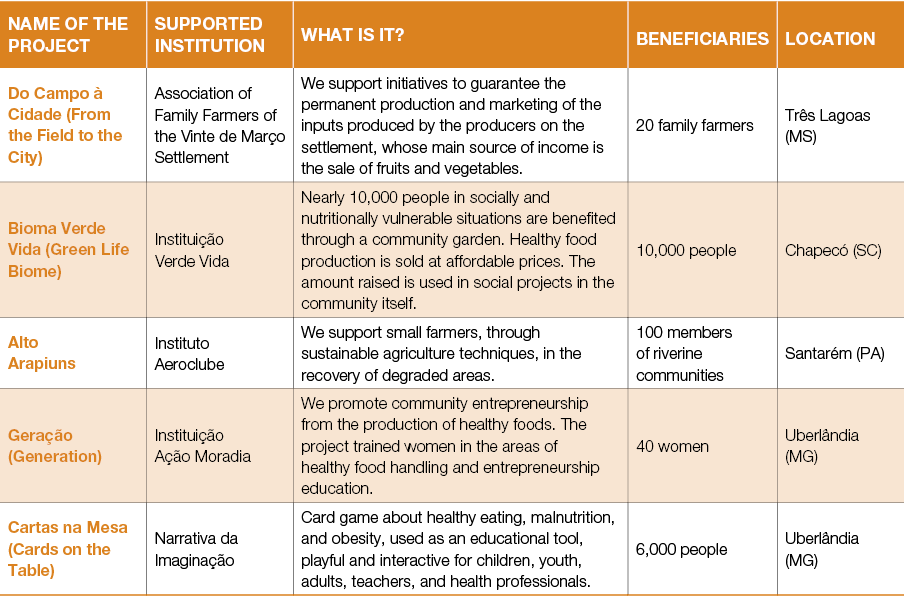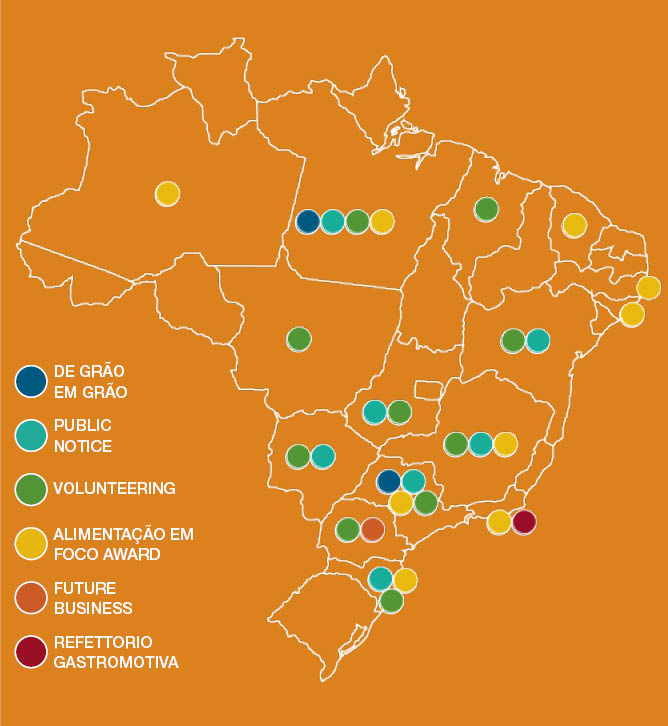
Cargill and society
The future of our business depends on the capacity for change throughout our production chain. Taking a leading role in safe, responsible, and sustainable food is necessarily driven by how we manage our value chain and by our commitments to environmental conservation and restoration. It also depends on relationships with rural producers, communities, clients, NGOs, governments, and national and international institutions. To this end, Cargill invests in a mature and lasting relationship with these stakeholders in order to contribute to the continuous evolution of the company, the industry, and Brazil.
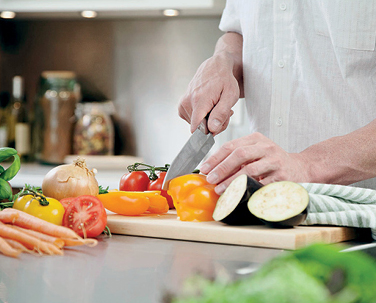
Quality relationship
In this section, we highlight the main initiatives toward our relationship with society and the communities close to our operations, and we update their progress in 2016. They are presented on the following fronts:
Business responsibility
Our commitments
• Cargill Forest Policy
• Sustainability in the soybean supply chain
• Sustainability in the cocoa supply chain
Our environmental indicators
Social and environmental programs
Cargill Foundation
Business responsibility
Our guidelines
The quality and safety of food offered by Cargill also depend on the trusting relationships we have established with our suppliers. The company's commitment to ethics and best social and environmental practices extends throughout our value chain. For this purpose, two key documents guide our business relationship. One of them, the Supplier's Code of Conduct, sets the operation guidelines for this stakeholder, according to the values and ethical principles of the company. The other, the Buyer's Code of Ethics, brings together a set of rules for our professionals.
Direct purchases of materials and inputs are governed by the Supplier's Code of Conduct, which establishes the rules for supply and whose formal acceptance is a condition to participate in any procurement process with the company. All Cargill investment agreements and contracts include clauses that address human rights issues such as the eradication of bonded labor and child labor. (G4-HR1, G4-HR10)
Access here and know in full the Code of Conduct of the Supplier and the Code of Ethics of the Buyer.
Georeferenced monitoring
In accordance with Brazilian law, Cargill does not purchase agricultural products or grains from illegally deforested areas. In order to assure ourselves of the origin of our raw material, today we have in place advanced mechanisms of information analysis. Through geographic information systems, we can monitor and analyze our grain supply chain.
Cargill also has a partnership with the NGO World Resources Institute (WRI) for the development of global geo-referenced public information bases to monitor supply chains linked to the agricultural sector. Another key reference in this process is the list of embargoes – from producers who are not in compliance with the legislation – made available by the Brazilian Institute of the Environment and Renewable Natural Resources (IBAMA).
Cargill consults the document for each new contract, and we commit to not market products from such areas, as well as not to negotiate the sale of inputs or financing for them. To this end, we have in place strict internal procedures ensuring that we do not conduct business with any embargoed area.
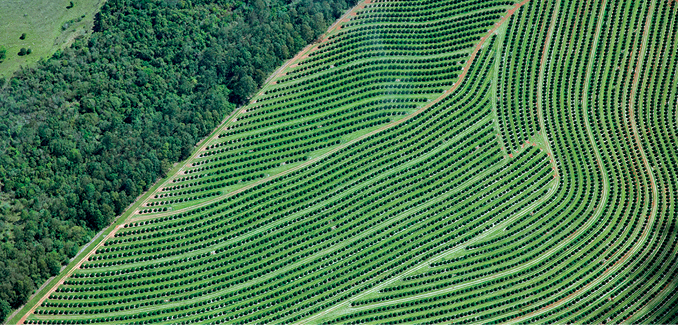
Global partnership (G4-15)
In 2016, Global Cargill created a partnership with WRI for our businesses worldwide, to strengthen sustainability in our supply chain and ensure our partners the safety and transparency of our environmental practices. WRI developed a platform to consolidate forest loss data, to which Cargill Brasil also contributes in order to make the available information more robust and accurate for the company, the industry, and other stakeholders.
We make sure our raw materials do not come from illegally deforested areas.
Our commitments (G4-DMA)
Not one hectare less (G4-15)
Forests are fundamental to the present and future of Cargill and the planet. That is why we are committed to reducing deforestation in all our agricultural supply chains. Among several actions in this regard, the company supports the New York Declaration on Forests since 2014.
We use our knowledge as one of the world's largest buyers of soybeans, palm oil, and other crops to promote sustainable agriculture. We work with farmers, governments, environmental organizations, and members of the communities in which we operate to find practical and scalable solutions.
In Brazil, recent reports point to progress and challenges on this journey, with emphasis on ten years of the Moratória da Soja (Soy Moratorium) (see Ten years of the Moratória da Soja). Cargill currently works with over 15,000 soybean farmers and collaborates with governments, NGOs, and partners to implement the Brazilian Forest Code and promote forest protection.
Nourishing the world and protect the planet
Learn about our main initiatives in recent years focused on feeding the world and protecting the planet.
2004
We have been tracking and managing deforestation linked to our supply chain via satellite.
Since then, we have also supported The Nature Conservancy (TNC) in the Soja Mais Sustentável (More Sustainable Soy) project (see project details in "Soja Mais Sustentável").
Cargill joined the Round Table on Sustainable Palm Oil.
2006
Launch of the Moratória da Soja (Soy Moratorium), which has been defended by industries in the sector and environmental organizations for ten years (see more information in "Ten Years of the Moratária da Soja").
2009
Creation of the Cargill Sustainability Committee (see "Sustainability Committee").
2011
Launch of the Soja Plus Program (see "Soja Plus").
Expansion of the Soja Mais Sustentável project to Mato Grosso (see "Soja Mais Sustentável").
Launch of the Cacau Mais Sustentável (More Sustainable Cocoa) project in Pará (See "Cacau Mais Sustentável").
2014
At the United National Climate Change Confevrence, Cargill joined dozens of other companies, governments, and civil society groups from around the world to support the New York Declaration on Forests. The signatories pledged to do their part to reduce, stop, and reverse the global loss of forests, and increase food safety for all.
We issued a palm oil policy aimed toward eliminating any source of this substance from our supply chain that is linked to the deforestation of environmentally sensitive areas, including peat bogs and the exploitation of Indigenous communities.
2015
We launched the Cargill Policy on Forests, a document with company commitments and goals that includes the approach to evaluating our suppliers and our investments based on forest protection principles (see details in "Global forest protection policy").
International recognition through 3S Certification (see under "3S Certification").
2016
We supported the extension of the Moratória da Soja for an indefinite period.
We developed our first Forest Report, which describes the progress made in our action plans to protect them and promote sustainable land use in our supply chains for cocoa, soybean, palm oil, cotton, corn, and packaging based on fiber. It was released in January 2017 and is available here.
Global forest protection policy
(G4-EN27)Cargill's Forest Policy, launched in 2015, expresses our commitment to protecting the planet's most biodiverse areas by reducing deforestation by 50% across our agricultural production chain by 2020 and by 100% by 2030. Another commitment to mitigating our environmental impacts is the Forest Protection Action Plan.
The Forest Policy establishes:
Compliance with the law in all regions where our production chain is present.
Fostering family farming.
That environmental principles will always be adopted in the company's future investments.
That suppliers that do not comply with the principles of the Policy will be suspended.
The adoption of seven practical steps to protect forests, overseen by corporate areas and the Cargill Sustainability Committee.
Principles
Rural producers and consumers are important partners in this debate.
Market forces can help.
Product and process innovation may help to find ways to produce more with less, reducing our impact on the environment.
The world needs solutions at scale.
Seven steps to forest protection
Assess current deforestation risks in value chains and prioritize actions.
Assess current procurement practices across the value chain and determine where they contribute to forest loss.
Assess the current state of forest loss in the regions home to Cargill's production chain.
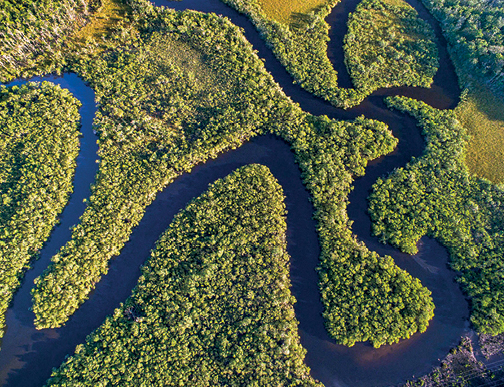
Engage producers and suppliers in the principles of the Forest Policy.
Establish processes for monitoring and identifying local partners to help build competencies.
Contribute to sector leadership and seek collaboration with business, government, and civil society partners to develop institutional responses.
Disclose results annually.
We are committed to eliminating deforestation linked to our value chains.
Forest Report
The main results of our initiatives in Brazil were disclosed in the 2017 Forest Report:
Direct activities
Evaluation of over 12,000 farmers in our soybean supply chain regarding the progress of implementing the Cadastro Ambiental Rural (CAR – Rural Environmental Registry). Currently, 60% of producers are registered with the CAR.
Maintenance of restrictions on the areas embargoed by IBAMA (illegal deforestation) and the Pact for the Eradication of Bonded Labor, for all origination of agricultural products by Cargill.
Expansion of the Soja Mais Sustentável program with The Nature Conservancy (TNC) in order to advance producers' compliance with the Forest Code, in addition to the CAR, in the States of Mato Grosso and Pará.
Training and education of the 300 employees of Cargill's sales team, to evaluate and monitor the progress of the implementation of the Forest Code and guide producers concerning the CAR.
Development and distribution of 18,000 brochures and 200 banners focused on communication and guidance on the Brazilian Forest Code for farmers and farmers' associations.
Translation and distribution of 1,000 copies of the Imaflora guidelines to implementing the Forest Code, for international producers and partners.
Sectorial actions and multistakeholders
Participation in the Grupo de Trabalho da Moratória da Soja (Soy Moratorium Working Group) and in the development of the strategy that led to its extension without an expiration date. In addition, we worked on building a Working Group to defend the transparency of Forest Code information, with the participation of the Brazilian Association of Vegetable Oils Industries (ABIOVE), Greenpeace, TNC, the Amazonian Environmental Research Institute (IPAM), and the World Wide Fund for Nature (WWF).
Participation in the Protocolo Verde de Grãos (Green Grain Protocol) of the State of Pará, which incorporates the CAR as a requirement for grain purchasing and origination.
Support and expansion of the Soja Plus Program for the MAPITOBA States (Maranhão, Piauí, Tocantins, and Bahia), with the CAR incorporated as a key indicator in the process.
Execution of a cooperation agreement with the Ministry of the Environment to support the implementation of the CAR.
Focus on education, involvement, and awareness, in order to improve and support implementation of the Forest Code, including:
• Distribution of 10,000 folders to producers and producer associations on the procedure for implementing the CAR.
• Distribution of 2,000 banners to encourage the implementation of the CAR in all producer associations and branches of Banco do Brasil in the State of Mato Grosso.
• Distribution of 5,000 manuals on the implementation of the Forest Code.
Read the complete Report here.
To learn about the Forest Policy in its entirety, click here.
United to combat climate change
Cargill is a member of the Coalizão Brasil: Clima, Florestas e Agricultura (Brazilian Coalition on Climate, Forests, and Agriculture), and assumed the co-leadership of two working groups to implement the Brazilian Forest Code and Sustainable Logistics. The Coalizão Brasil is a multisector movement, composed of entities that lead agribusiness in Brazil, which discusses issues arising from climate change from the perspective of a new economy, based on the low emission of greenhouse gases (GHGs). The movement is based on a document including 17 concrete proposals, aimed toward reducing GHG emissions and a low-carbon economy. Learn more at http://coalizaobr.com.br/2016/index.php/en/.
Sustainability in the soybean supply chain
In this aspect, you will learn more about our transformative initiatives and examples of our relationship with rural producers that contribute to significant progress incorporating best agricultural practices and forest protection.
Soybean Action Plan
(G4-15)
To comply with our Global Policy for Forest Protection and eliminate deforestation in our production chain, we have established five priority areas and respective action plans for forest protection. One of them was specially developed for the production of soybeans in Brazil.
ACTION |
UPDATE |
|---|---|
Extension of the Moratória da Soja beyond May 2016 |
Agreement signed for an indefinite period |
Request the CAR as a requirement for purchase |
Diagnosis of the supply chain, communication campaign on the CAR (video), communication campaign on the Forest Code (Imaflora guide), producers without the CAR sign a declaration making the commitment to register |
Ensure that all suppliers comply with the Brazilian Forest Code |
|
Lists of embargoed and bonded labor areas as a purchasing criteria |
Procedure for list consultation established for soybean purchase |
Partnership with industry, government, environmental organizations, and clients |
Participation in the Coalizão Brasil and the Grupo de Trabalho da Soja (GTS – Soybean Working Group) |
Ten years of the Moratória da Soja (Soy Moratorium) (G4-15)
In 2016, we
celebrated
ten
years of the
Moratória da Soja.
In 2016, we celebrated ten years of the Moratória da Soja – an unprecedented initiative that brought together companies, associations, NGOs, and the Brazilian government in a sole commitment to not cultivate, market, or finance soybeans produced in deforested areas of the Amazon biome. The agreement has contributed to reducing deforestation in the region over the past decade.
Some analyzes pointed to soybeans as one of the vectors responsible for deforestation in the Amazon region. There was, however, a lack of precise information and data to estimate the involvement of the soybean crop in this problem, a fact that did not diminish the greater concern, which was to address the deforestation problem. Cargill had already begun a partnership with The Nature Conservancy (TNC) in 2004 to foster best practices for rural producers in the region. But, more was needed, the joint commitment of all parties involved.
Thus, the private sector, civil society, and the federal government, represented by the Ministry of the Environment and Banco do Brasil, began working together through the Grupo de Trabalho da Soja (GTS – Soybean Working Group). In this group, monitoring soybean planting in the Amazon biome was improved through satellite imagery. Based on this assessment, companies were given guarantees regarding suppliers who could offer soybeans in areas free of deforestation.
Gradually, the Brazilian government has also been implementing measures that help reduce deforestation, such as the beginning of integrated surveillance operations in 2009 – IBAMA, Federal Police, Highway Police, the Army, and state environmental departments. In 2012, the new Brazilian Forest Code came into effect, introducing two important instruments: the CAR and the Programa de Regularização Ambiental (Environmental Regularization Program). In May 2016, we supported the renewal of the commitment for an indefinite period – until it is no longer needed.
Cargill follows this evolutionary movement and has actively participated in important initiatives related to sustainability. The Moratória da Soja shows that it is possible to produce grains, serve our clients, and feed our populations while respecting natural resources.
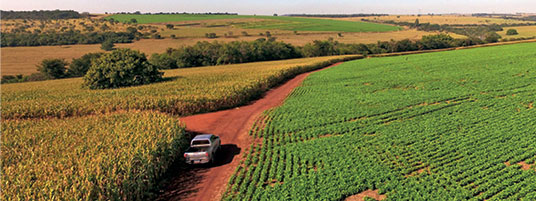
Cadastro Ambiental Rural
(CAR – Rural Environmental Registry)
An action plan addressing the Forestry Policy was developed especially for the soybean production chain in Brazil, with specific goals and deadlines. Our commitment in 2016 was to begin an intense communication campaign with producers on the Cadastro Ambiental Rural, and to carry out the analysis of about 15,000 suppliers regarding adherence to the Forest Code, specifically the CAR.
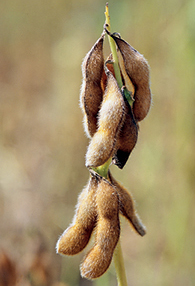
Soja Plus (G4-15)
Soja Plus is a free and voluntary educational program to continuously improve the economic, social, and environmental management of Brazilian rural property, preparing it for sustainable production and meeting market demands. It seeks to contribute to the conservation of natural resources, the governance of productive activities, and the social well-being of workers, rural producers, and local communities. The program was created in 2011 through a partnership between the Brazilian Association of Vegetable Oils Industries (ABIOVE) and the Association of Soybean and Corn Producers of the State of Mato Grosso (APROSOJA/ MT). Currently, it is present in four states – Mato Grosso, Mato Grosso do Sul, Minas Gerais, and Bahia –, based on partnerships between producers, industry, civil society, academia, and financial institutions. Producers participating in the program receive training courses on environmental and social legislation as well as personalized technical assistance on their properties.
Partnership with the University of Viçosa
As part of the Soja Plus program, Cargill is supporting a differentiated model in Minas Gerais, conducted in partnership with the University of Viçosa in three main stages:
Students are selected for training in quality of life in agriculture, health and safety in rural work, and labor legislation.
Then the trainees are sent to selected farms with the help of Cargill, where they stay for a week to apply a checklist.
At the end, each student presents an action plan to the farmer with information about what and how to improve their processes.
Also participating in the training are the Federation of Agriculture and Livestock of the State of Minas Gerais (FAEMG), the National Rural Apprenticeship Service (SENAR), the Institute Antonio Ernesto de Salvo (INAES), ABIOVE, and unions
Watch the video about the program's experience in Minas Gerais.
Protocolo Verde de Grãos
(Green Grain Protocol)
(G4-15)
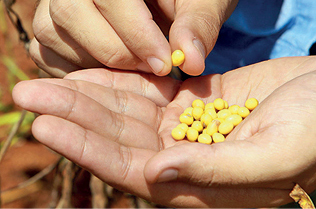
The Protocolo Verde de Grãos, signed in 2014, is one of the agreements between the government of Pará, the Public Attorney's Office, and the private sector to eliminate illegal deforestation in the main production chains in Pará. It is a voluntary and private instrument, but it includes the consent and participation of the government.
The Protocol establishes criteria for responsible purchasing in the soybean production market in Pará, which attest to the environmental and social regularity of the agricultural products sold. The criteria for purchase are:
Have the CAR
Issue an invoice
Not be on the list of embargoed areas
Not be on the list of areas with reports of bonded or compulsory labor
Check for illegal deforestation by the Project for Monitoring Deforestation in the Legal Amazon by Satellite (PRODES)
Cargill commits to not market soybeans in Pará with producers that do not meet all these criteria.
Soja Mais Sustentável (More Sustainable Soy) (G4-15)
The Soja Mais Sustentável (More Sustainable Soy) project has been carried out through the joint efforts of Cargill and the NGO The Nature Conservancy (TNC) since 2004. The initial objective was to ensure that all company suppliers in the Amazon region were in compliance with their environmental obligations, for through inclusion in the Cadastro Ambiental Rural (CAR), the first step towards definitive environmental regulation. To this end, the program carried out, together with producers, the environmental diagnosis of properties and the identification of Permanent Preservation Areas (PPAs), Legal Reserves (LRs), environmental liabilities, and remnants of vegetation on the properties. With this data and the CAR, rural producers have a strong environmental management tool at their disposal. Since then, the project has evolved in important ways.
PHASE 1
Inclusion of 383 soybean-producing properties, from Santarém (PA) to Belterra (PA), in the CAR.
The project expanded and covered the cocoa production chain in São Félix do Xingu (PA).
It also inspired the creation of an environmentally adapted model, which was followed by other companies, organizations, and governments with which the TNC later worked.
PHASE 2
Investments of USD 3 million to support actions protecting the Amazon and the Cerrado, advancing the issue of environmental adequacy of soybean supplying properties and expanding best agricultural practices and responsible grain production to municipalities in the north of Mato Grosso, and neighbors to highway BR-163 (Cuiabá-Santarém).
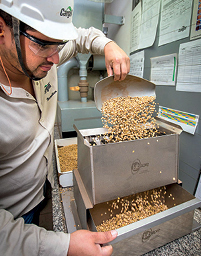
PHASE 3
With the end of the CAR registration period, Soja Mais Sustentável enters a new phase until 2018, which is the post-CAR agenda of compliance with the Forest Code. The project will support the governments of Mato Grosso and Pará in complying with the Programa de Regularização Ambiental (PRA – Environmental Regularization Program) and in developing technologies for the recovery of degraded areas through pilot properties in both states.
RESULTS
847 properties in Mato Grosso underwent detailed environmental analysis; individual reports generated from these analyses were delivered to trade unions and property owners. These producers are being prepared for the new environmental challenges, especially for the implementation of the Forest Code.
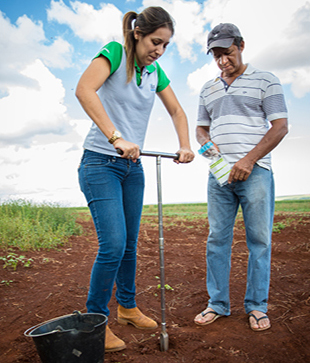
Programa Cargill de Agricultura Familiar (Cargill Family Agriculture Program)
Currently, the program serves about 1,000 individual family farmers and 1,200 through cooperatives. It accounts for the production of 200,000 tons of soybeans in 120 cities in the states of Goiás, Mato Grosso do Sul, Minas Gerais, Pará, Paraná, Rio Grande do Sul, Santa Catarina, and São Paulo. The Programa Cargill de Agricultura Familiar enabled our biodiesel plant in Três Lagoas (MS) to obtain the Social Fuel Seal, granted by the Ministry of Agrarian Development (MDA) to biodiesel producers that promote social inclusion and regional development by generating jobs and income for family farmers who have the Statement of Eligibility to PRONAF (DAP).
Querência+ Project: Sustainable Landscapes
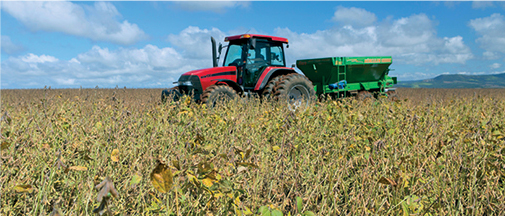
The project aims to establish local pacts to improve the social and environmental performance of production chains in the city of Querência (MT). It is coordinated by the Amazon Environmental Research Institute (IPAM) and relies on the technical cooperation of several organizations to carry out actions in three main areas: strengthening environmental governance, strengthening family agriculture, and supporting the creation of the Multisector Forum. Cargill contributes to the project by engaging local producers through the 3S and 2BS certifications, thus encouraging best social and environmental practices and controlling deforestation on Querência properties.
3S Certification
Six years ago, demanded by the needs of agribusiness, Cargill decided to implement its own environmental certification, with indicators defined based on rigorous benchmarking and a focus on soybean producers. In 2016, our 3S Certification (Solutions for Sustainable Procurement) gained special support: the technical assistance of the BioSystemic Institute (IBS) in our processes.
Developed in 2010, the 3S Program is a voluntary environmental certification that contributes to zero deforestation and encourages best production practices by providing rural producers with the necessary guidance for the production of more sustainable soy in social and environmental aspects. Currently, it is present in three states: Paraná, Mato Grosso, and Pará, in which 170 soybean producers are now certified. Certification processes and procedures are verified annually in Brazil by independent auditing.
Partnership with the BioSystemic Institute (IBS)
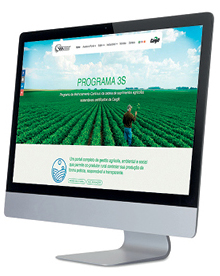
Provides technical assistance to rural producers who are part of the certification program. In partnership with Cargill, 3S Certification is implemented in four stages: educating producers, diagnosis of the property, preparation of an individual action plan, and continuous improvement. The 3S Certification process foresees in its scope two years of monitoring the producers.
Communication channels
Producers have several communication channels with the IBS to answer questions and assist them when implementing the action plan. Among them, WhatsApp groups, 0800, SMS, newsletters, booklets, and a 3S portal which centralizes the information from the diagnosis and, thus, facilitates the producers' monitoring of the indicators.
Benefits
The initiative combats the degradation of land with high environmental value, guarantees worker well-being, and manages greenhouse gas emissions (GHG), while increasing the engagement of producers in the search for sustainable practices with continuous improvement – a differentiator of the program. Producers are encouraged to systematically evolve regarding aspects such as land use, best agricultural practices, compliance with labor legislation, and worker's OH&S. The 3S also considers product traceability in its mass balance control system. As a result of all these benefits, rural producers expand their perspectives in the market and improve their management.
Other certifications
Cargill also works with two certifications for the production of biodiesel: 2BSvs (Biomass Biofuels Sustainability voluntary scheme) and ISCC (International Sustainability & Carbon Certification). The 2BS standard is focused on biodiesel production in Europe and was developed to enable farmers, throughout the biomass supply chain, to demonstrate that their products are in compliance with the European Renewable Energy Directive. The 2BS soybeans produced by Mato Grosso do Sul producers participating in the Programa Cargill de Agricultura Familiar (Cargill Family Agriculture Program) are sent to the Três Lagoas factory, which produces ISCC – certified biodiesel.
RTRS
Cargill holds the Round Table on Responsible Soy (RTRS) certification for the chain of custody of two of its plants: Rio Verde (GO) and Uberlândia (MG). The two plants receive soybean production from a certified group of producers in Goiás and Minas Gerais. In this way, Cargill contributes to the achievement of the sustainability goals of one of its important clients.
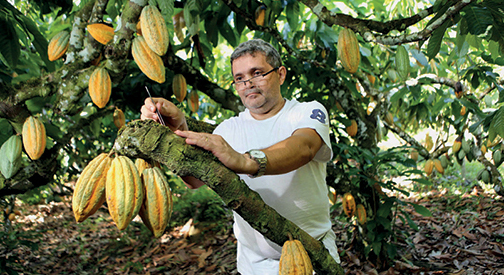
Sustainability in the cocoa supply chain
(G4-DMA)
Increase efficiency and expand agricultural production in Brazil in a sustainable way. This is one of the major challenges for the cocoa industry in Brazil, an aspect that has been guiding Cargill's initiatives, strengthening dialogue with rural producers and boosting partnerships between Cargill with companies and entities linked to the sector.
UTZ Certification
We started a pioneering sustainability project when we brought UTZ certification to Brazil in 2012, which follows a strict code of conduct regarding best agricultural practices and compliance with environmental and labor legislation. Until then, 100% of our cocoa was purchased via third parties. By encouraging certification, we began buying about 5% of our cocoa directly from the producers who wanted to certify. We ended 2016 with 90 certified farms, equivalent to approximately 10,000 hectares, in the states of Bahia and Espírito Santo. Our goal is to certify 200 farms by 2019.
National strategy
90
farms with UTZ
certification of
best agricultural
practices.
Brazil is the only major country in this segment that produces and consumes 100% of its cocoa, which generates stress in the market in periods of instability, such as the drought that affected the crop in 2016. Therefore, increasing productivity by ensuring sustainable practices in the field and industry will represent a major breakthrough for the industry in the coming years.
To this end, in 2016 Cargill decided to go further and impact the chain as a whole. As a member and one of the leaders of the Association of Cocoa Processing Industries (AIPC), and with the participation of other industries in the sector, we have defined a national strategy to increase cocoa production: in five years, the plan is to jump from 200,000 to 300,000 tons of production of the raw material in the country.
The program called Nível Brasil (Brazil Level) is a result of the lessons learned and experience that this group of companies already has about the sustainable production of cocoa. We at Cargill are contributing, for example, to projects that started in the last five years within the company, and may now gain scale through industry collaboration. Among them, the Cacau Mais Sustentável and the Tuerê Project can be highlighted (see below). Achieving a sustainable vision for increased cocoa production favors industry, strengthens rural producers, and makes our product more competitive overseas.
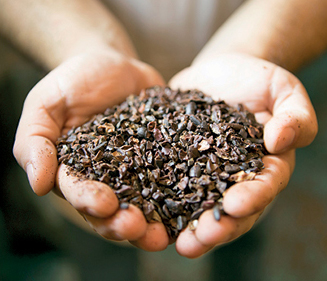
Cacau Mais Sustentável (More Sustainable Cocoa)
Cargill also operates in the areas of cocoa production in Pará. One of the projects is Cacau Mais Sustentável, created with the support of The Nature Conservancy (TNC) of the Ministry of Agriculture, through the Executive Commission of the Cocoa Plantation Plan (CEPLAC), and the Alternative Cooperative of Small Rural and Urban Producers of São Félix do Xingu (CAPPRU). The main objective is the environmental regularization of rural properties through the Cadastro Ambiental Rural (CAR) and income generation in the São Félix do Xingu micro region. One of the assumptions of this action is to recover the deforestation area of the Amazon. Today, there are 83 producers that have incorporated sustainable practices and represent an approximate area of 400 hectares of planted cocoa, with estimated production in five years of approximately 400 tons.
Tuerê Project
Another initiative related to cocoa is the Tuerê Project, in the city of Novo Repartimento (PA). We work in partnership with the Solidaridad Network, CEPLAC, and the Municipal Department of Agriculture. The initial objective was to work within the largest rural settlement in Latin America, with about 3,000 families, initially selecting 17 producers who participated in the application of the tool called Horizonte Rural (Horizon Rural), which diagnoses the main production bottlenecks and presents alternatives. This project revealed the need for technical assistance, environmental regularization, and better access to the market. By the end of 2016, a total of 50 producers benefited from this initiative.
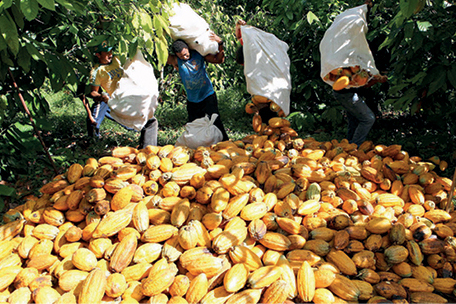
Southern Bahia
We also note that 75 producers in southern Bahia have benefited from training and qualification. Farmers improve their knowledge of technology and technical support to help them achieve better productivity, while the community benefits from projects that improve their environment, health, and nutrition. For this action, Cargill has had a partnership with the National Rural Apprenticeship Service (SENAR) since 2014.
Environmental indicators
Total volume of water withdrawn, by source (G4-EN8)
(m³)
June 2016 to Nov. 2016
2015/2016
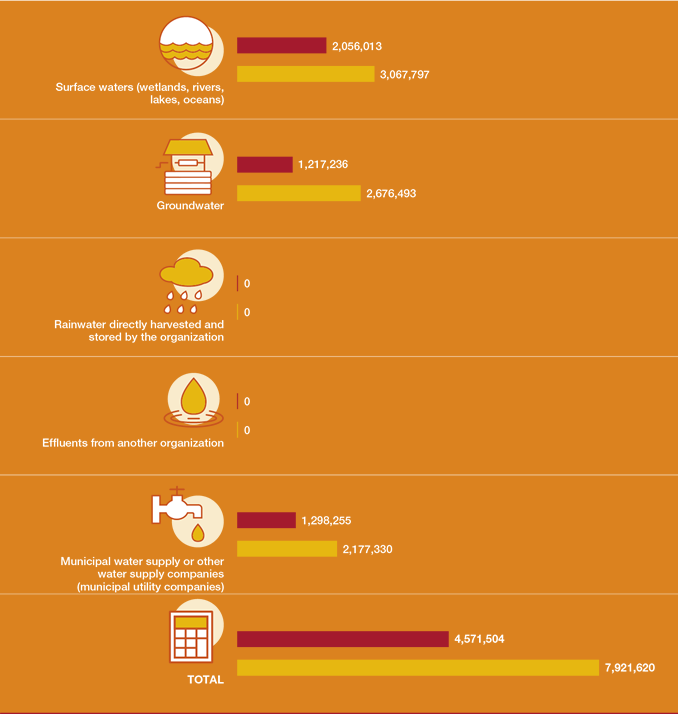
Percentage and total volume of recycled and reused water (G4-EN10)
June 2016 to Nov. 2016
2015/2016
2014/2015
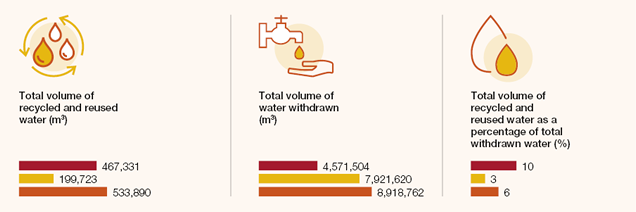
The total volume of recycled and reused water increased significantly compared to 2015/2016. The reason for this was a change in monitoring, which began to incorporate the Goiânia unit in the period covered by the Report. There was also a higher reuse rate in order to reduce the need for external water collection.
Gross direct emissions of greenhouse gases (GHGs) – Scope 1 (G4-EN15)
(tCO₂eq*)
June 2016 to Nov. 2016
2015/2016
2014/2015
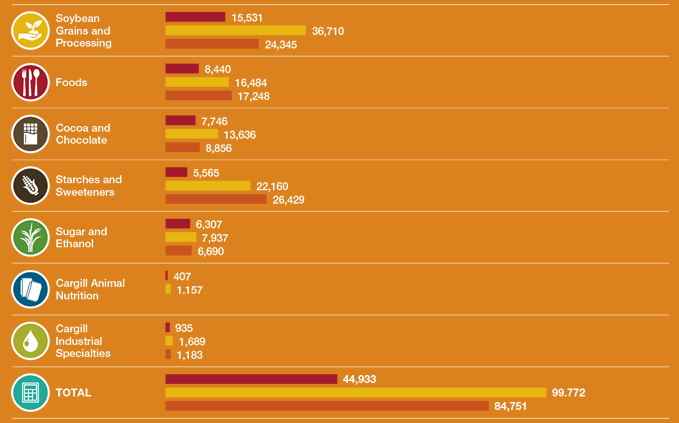
*The methodology adopted was the GHG protocol, and the gases included in the calculation are: CO₂, CH₄ and N₂O. Biogenic emissions of CO₂ were not managed. The consolidation approach chosen for the emissions was operational control.
Indirect emissions of greenhouse gases (GHGs) from purchased energy – Scope 2 (G4-EN16)
(tCO₂eq*)
June 2016 to Nov. 2016
2015/2016
*The methodology adopted was the GHG protocol, and the gases included in the calculation were: CO₂, CH₄ and N₂O. The consolidation approach chosen for the emissions was operational control.
Rate of greenhouse gas emissions (GHGs)* (G4-EN18)
(%)
June 2016 to Nov. 2016
2015/2016
*The metric used to calculate this rate is a ratio between the GHG emission intensity per ton produced by each enterprise. Scopes 1 and 2 emissions are added and then divided by the amount produced. The gases included in the calculation are: CO₂, CH₄ and N₂O. The types of GHG emissions included in the intensity rate are direct (Scope 1) and indirect (Scope 2).
Volume of NOX, SOX and other significant air emissions for each of the following categories (G4-EN21)
(t)
June 2016 to Nov. 2016
2015/2016
Total volume of planned and unplanned water discharge, by destination (G4-EN22) – (m³)
June 2016 to Nov. 2016
2015/2016
2014/2015
Volume of significant air emissions for each of the following categories* (G4-EN23) – (t)

*The waste disposal method was determined by the contracted company responsible for the work.
The figures for each type of waste generated indicate a constant decrease in the volume generated. Considering an estimate for the end of fiscal year 2016/2017, we project a reduction of 7% compared to fiscal year 2015/2016 and 25% compared to fiscal year 2014/2015.
Total weight of each of the following transported and treated waste* (G4-EN25) – (t)
June 2016 to Nov. 2016
2015/2016
2014/2015
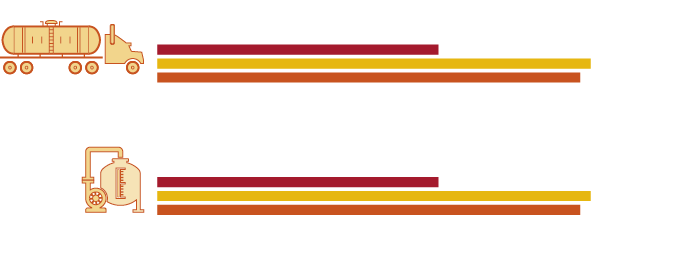
*Sent to specialized companies that decontaminate and send to the final destination 100% of the hazardous waste. No hazardous waste is transported internationally.
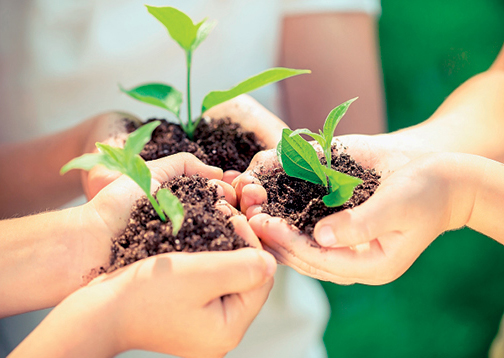
Our environmental education projects
Learn about Cargill's initiatives focused on the environmental awareness of children, youth, and adults.
Prêmio Cargill de Sustentabilidade (Cargill Sustainability Award)
This contest, sponsored by Cargill Brasil, aims to reward practices and projects (carried out or not) of its employees and third parties that present initiatives for the intelligent use of natural resources in the company and in the communities where we work or with which we coexist.
Its third edition, in 2016, recognized initiatives aimed toward energy use. There were 37 registered projects, 14 participating locations, and over 70 employees involved. In the end, three winners were chosen, one in each category: Company in Action; Innovation Company; and Home and Community in Action. The results of the projects received add up to an annual savings of 1,700 kilowatt-hours of energy and BRL 5.3 million for the company.
Ação Renove o Meio Ambiente (Action to Renew the Environment)
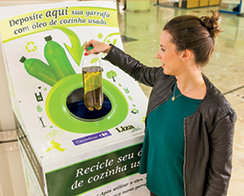
WHAT IS THIS
Carried out since 2010, this is an initiative of the brand Liza with the goal of offering consumers a practical and sustainable alternative for the environmentally correct disposal of spent cooking oil. Currently, it has over 650 collection points in 8 Brazilian states: São Paulo, Rio de Janeiro, Minas Gerais, Goiás, Santa Catarina, Paraná, Rio Grande do Sul, and Mato Grosso do Sul.
HOW IT WORKS
Cargill coordinates partnerships with supermarket chains, companies, and NGOs to implement a kitchen oil recycling and waste shipment system for biodiesel production. Lectures on recycling, environmental preservation, and environmental education and awareness actions are also part of the program.
BENEFITS
Cooking oil, if dumped in sinks and drains, causes damage to the sewage system, and in some cases, may even impact the quality of water from rivers, dams, lakes, and groundwater. Thus, through the program, the population may correctly dispose of their waste and contribute to producing a more sustainable fuel. Since its launch in 2010, the program has already collected over 1.7 million liters of postconsumer cooking oil, sufficient to pollute up to 42.5 billion liters of drinking water, which is the volume of water necessary to supply the basic needs of the population of the city of São Paulo, with 11,967,825 people, for 32 days. According to the United Nations, each person needs 3,300 liters of water per month (about 110 liters of water per day) to meet their consumption and hygiene needs.
2016 HIGHLIGHTS
The Action Renew to Renew the Environment is gaining more and more relevance and scope throughout the country. Recognized by its educational nature and the focus on end consumers, we have achieved very important results and gained recognition. In 2016, we began expanding the program to our foodservice clients. Today, in addition to providing oils and fats, we are responsible for managing and correctly disposing of waste from large generators, turning our chain increasingly more sustainable.
For more information on the locations of the stations, click here.
Ecoarte
WHAT IS THIS
A major initiative toward environmental education and awareness about recycling. The Ecoarte project went to nine cities in the state of São Paulo, impacting 10,000 people.
Through the brands Liza, Elefante, and Pomarola, we carry out cultural activities centered around recycling. Over 10,000 PET bottles, 600 cans of Pomarola tomato sauce, and tens of kilos of cardboard that would have been discarded and considered unusable gained new meaning in the hands of students aged 6 to 16 from public schools in nine cities in the state of São Paulo. These municipalities were visited by a traveling truck that explained to the visitors how to recycle the various types of packaging.
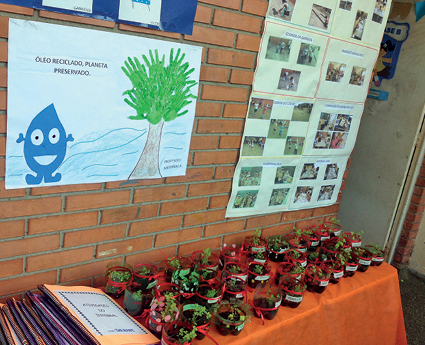
HOW IT WORKS
Municipal schools in the state of São Paulo are invited to expand the environmental knowledge of the community through work developed by their students in workshops about recycling and reuse of materials, assembling plays, videos, and other activities. Teachers also participate in special workshops on the National Solid Waste Policy (PNRS) and guidelines for working with children. On weekends, an event in a square open to the public works to raise environmental awareness toward recycling for all those who participate in the action.
BENEFITS
Children, youth, and adults gain awareness of their responsibilities concerning the generation and correct disposal of waste and recyclable packaging.
Programa Meio Ambiente nas Escolas (Environmental Program in Schools)
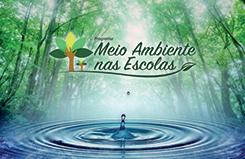
WHAT IS THIS
A partnership between Cargill with Preserva Recicla and the Auá Institute of Social and Environmental Entrepreneurship, focusing on environmental education in public schools in five municipalities of São Paulo: Carapicuíba, Cotia, Itapecerica da Serra, Itapevi, and Mairinque.
HOW IT WORKS
Environmental educators in the school's learning process throughout the school year, accompanied by the Environmental Department and the Board of Education, carry out awareness activities on environmental preservation and waste management issues, and the strengthening of the reverse logistics network of edible oil, implemented by Preserva.
2016 HIGHTLIGHTS
In 2016, a total of 49,848 students from 128 schools benefited from the program. The consolidated oil collection shows that 17,943 liters were collected, representing over 8,970 packages sent for recycling and BRL 7,177.20 reverted to the schools' ParentTeacher Associations (APMs).
Life cycle analysis
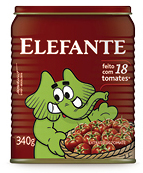
A fundamental methodology for sustainability management, still seldom used in the Brazilian market, began to be applied by Cargill in 2016.
Through this tool, focused on life cycle analysis, we were able to define the actual environmental impact of each phase involved in the development of a product. For this diagnosis, we chose the production chain of the Elefante brand tomato paste.
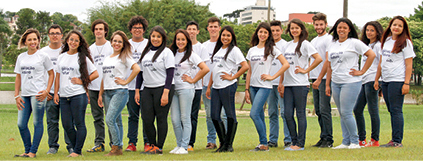
Thinking about the Future
Implemented in the municipality of Castro (PR) in 2014, along with the inauguration of our factory, the Geração Futuro (Future Generation) program has already benefited 591 young adults with 26 courses. Structured on three action fronts (citizenship, professional qualification, and entrepreneurship), in 2016 we began the line called entrepreneurial generation, through which we promote the development of a business ecosystem between young people and adults in the Castro region. Participants are encouraged to identify new business opportunities in the food value chain. As a learning strategy, at the end of the cycle, those responsible for the businesses with the greatest potential visited similar companies already consolidated.
Cargill Foundation (G4-SO1)
Created in 1973, the Cargill Foundation supports, develops, and implements social projects in the communities where the company is present. Our mission is to promote healthy, safe, sustainable, and accessible food from the field to the consumer's table, disseminating knowledge and enabling initiatives that promote social change based on innovative actions that generate sustainability in the food production chain.
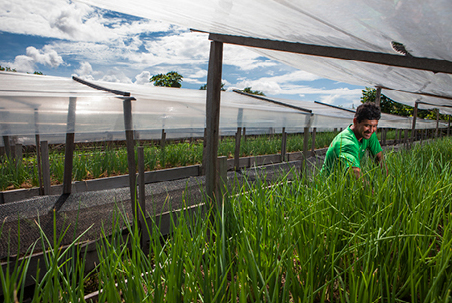
To this end, we rely on the partnership of volunteer employees, civil society organizations, institutions, and several associations that raise awareness toward the importance of healthy and balanced eating. In 2016, over 34,000 people benefited directly from the Foundation's actions.
The Cargill Foundation was established in
1973.
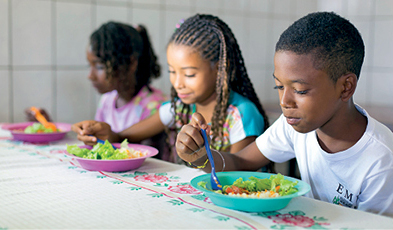
De Grão em Grão
Developed by the Cargill Foundation since 2004, the project De Grão em Grão (From Grain to Grain) qualifies the small producer of family agriculture to improve quality, diversification, and distribution of vegetables. In addition to improving the production routine, farmers are encouraged to form cooperative groups to expand marketing through federal incentive programs such as the Food Acquisition Program (PAA) and the National Food Program at Schools (PNAE).
Alimentação em Foco Award
The Cargill Foundation, in partnership with Enactus Brasil, annually holds the Alimentação em Foco (Food in Focus) Award, which focuses on innovative university projects in the area of healthy eating. Enactus is an international non-profit organization that fosters social entrepreneurship in universities. It operates in 36 countries and in over 1,700 educational institutions.
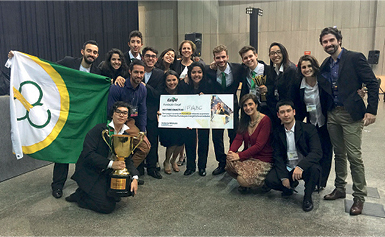
The award is an exclusive initiative for the 90 universities registered in Enactus Brasil. In 2016, the Award included over 30 participating institutions. Twelve innovative and transformative projects were selected that impacted on their local communities, of which three won the Enactus Brasil National Championship. The winners received financial support to develop the project and mentoring from the staff of the Cargill Foundation and Enactus Brasil.
Field research
In 2016, two diagnoses were performed:
Diagnosis of 23 priority locations, based on secondary data
More in-depth diagnosis of 4 locations, Goiânia (GO), Santarém (PA), Uberlândia (MG), and Três Lagoas (MS)
The plan is that, beginning 2018, our operations will be more coordinated with the results of these diagnoses.
Fountain of Youth
We promote the formation of healthy eating habits through the national campaign called Fonte da Juventude (Fountain of Youth). Created by the Novos Urbanos, a social behavior and consumption innovation group, the campaign promotes increased consumption of fruits and vegetables, and influences the agenda and public policies regarding eating and nutrition.

Education and food
To commemorate World Food Day (October 16), we launched the NutriQuiz app, which may be accessed on smartphones. Developed initially for a young audience, it is a question and answer game about food education. The user can, for example, understand the nutritional table and relate it to the ingredients that make up their food choices. For the Cargill Foundation, the app is an opportunity to interact with the audience and identify important issues to be worked on with society. The app is within everyone's reach. Just download it from the Play Store or the App Store.
Food innovation (G4-SO1)
We believe in social change through innovative projects that promote sustainable food solutions. Therefore, we seek to develop and collaborate with actions that have the power to generate impact and change. In 2016, we supported Refettorio Gastromotiva, a project designed by chef David Hertz, founder of Gastromotiva, and by chef Massima Bottura of the NGO Food for Soul. The initiative transformed the surplus of food served at the Olympic Village during the Rio 2016 Olympic and Paralympic Games into dishes prepared by renowned national and international chefs, all volunteers, to feed people in socially vulnerable situations. About 120 meals a day (lunch and dinner) were served free of charge, showing the power of food processing. From the initiative, approximately 6 tons of food was prevented from going into the trash. After the Olympics, Refettorio expanded its activities, and became a restaurant school and a hub for projects focused on food and social inclusion.
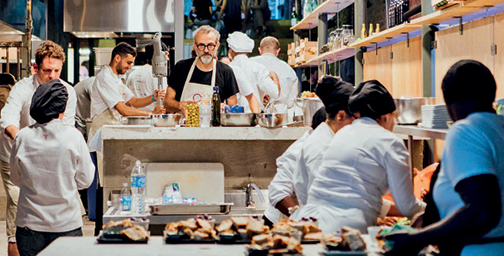


Partnerships for social change (G4-SO1)
The Cargill Foundation supports projects carried out by third parties, selected through public notice, with two central objectives: to engage our company in innovative proposals and to strengthen and recognize organizations that carry out important work in the country toward social change through healthy food.
